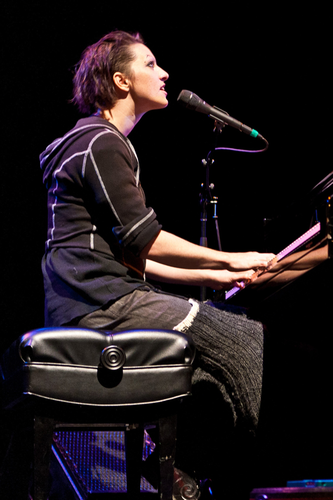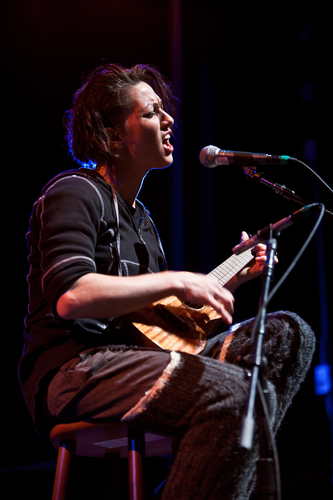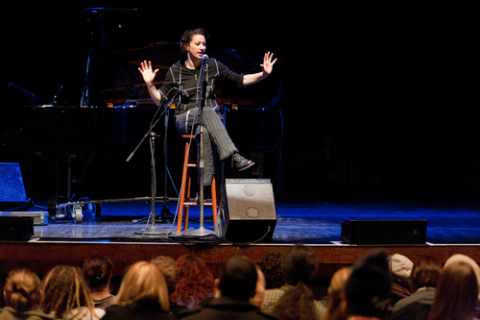Amanda Palmer on Creating a Record, a Career, and a Scene

Amanda Palmer treated students to "Ampersand," from her solo album produced by Ben Folds.
Photo by Michael Spencer

Palmer switched to ukelele for "Dear Old House That I Grew up in."
Photo by Michael Spencer

Amanda Palmer
Photo by Michael Spencer
Punk-cabaret singer Amanda Palmer (of the Dresden Dolls) dropped by the Berklee Performance Center for a clinic in December, in advance of her concert there with Berklee summer student Tristan Allen. Rather than monologuing about her own work, Palmer turned the clinic into a conversation, sitting cross-legged onstage and ferreting out more information about the students who lined up to ask her questions on everything from the future of the music business to throat surgery. The following is a condensed and edited sample of the event.
My question is about your throat. I had nodules, and everyone told me about you when I was going through the decision whether to get the surgery to remove them. So I wanted to know if you actually did get the surgery and how your voice and your artistry have changed since. —Eileen Esposito (music therapy, voice)
I found that when I was touring with the Dresden Dolls I was losing my voice more and more. When I first started playing shows, more than ten years ago, I would play a show and then not be able to talk for a day or two. And I just assumed that that sucked and I was going to have to live with it. Finally it got to the point where I was so unhappy on tour because I needed my voice as a tool not just to sing, but to communicate with people.
So I went to a doctor here in Boston, Dr. Zeitels. He's one of the top vocal surgeons in the world. I ran into Ozzy and Sharon Osbourne in his waiting room. Basically I had two little nodules bumping up against each other, just from years and years and years of abuse. Finally I went in and did the surgery. I couldn't talk for two weeks.
The challenge for me now is, once my voice came back, I was like, "This is great. I can hit notes that I wasn't hitting before. I don't have to warm up." It's very dangerous, because one of the things that I was always told was that I talk too loud, I sing too loud, I push too much. In my own immature way I just want to be able to hang on to my bad habits and do what I want and I don't want anyone to tell me what to do.
One of the things that I learned is that you don't have to always kill yourself and push 100%. That's one way of doing it, but it's kind of a one-trick pony, and if you've destroyed yourself in the process, it's very rock 'n' roll, but you're useless to yourself and to everybody else.
One of the challenges I've found is getting out there and having a (for lack of a better word) scene. I'm wondering if you have any advice as to how to create a really comfortable context for all different kinds of bands to come together. —Alison Rapetti (music therapy and songwriting, voice)
When I started the Dresden Dolls, one of the things that really was driving me was that I wanted to find that scene. I wanted to live the wonderful crazy artist's life with all my like-minded awesome people, and I was so disappointed when that didn't happen. We certainly didn't feel embraced by this huge excited music community. But, that being said, I lived in a cool artistic house, and we threw a lot of parties. We worked with what we had, and we created our own scene. The wider we toured we found the like-minded bands from all over the world. Interestingly, musically we often had nothing in common with these bands. These are the people that we want to have dinner with and drink with late at night. The scene is weird and online and loose-knit.
I think that's the life that every musician dreams about. You imagine yourself in Paris in the '20s. You're just going to find the right apartment, go downstairs, order your wine, and all of your friends are going to be like, "Rah!" It doesn't happen instantly, but you get moments like that.
One of the things that I've always found so confusing about the industry is that managers and agents and promoters and labels don't seem to understand that that's my fundamental motivation. I don't actually want to make money, be famous and successful, I want that wine moment. And they're not interested in that wine moment. Or if they are, they're interested in their own wine moment with their own people, not mine. So that's why the responsibility usually always winds up falling at your feet, and you have to just make it happen.
I have a mixing session coming up for my band, who recorded a track a couple months ago. We got the rough mix and scrutinized the hell out of it, took out every bad note, every wrong drum bit, every note sung out of tune. So I'm pretty exciting about the final mixing session coming up. Do you have any suggestions for what we should expect? —Michael Harmon (music business/management and music production and engineering, percussion)
I would suggest that you put someone in the band in charge of veto power, so if the band is arguing about the same thing for 90 minutes, someone can just dictate your way out of that situation, because getting the whole band to agree on everything is really hard. That's usually why bands hire producers, to just be a tie breaker.
My general advice to you is you can go in there with your sheet of a gazillion notes of how to make that recording perfect, but don't make it too perfect. I feel like I went through this on my first record. I hadn't quite learned yet that a song is made to impact somebody, and they're not listening for professionalism, they're listening for a song. There are things that can distract you from the song, but having things perfect doesn't necessarily enhance a song, and in fact, having little imperfect things can humanize a song.
Having the perfect recording doesn't have to be all that expensive. I'm of the opinion that you can make an incredible impact on people by just capturing the energy of your band and what they do to a live recording or a practice set. I would say you've got to figure out a way to capture the essence of what the band does. It doesn't have to be the end all and be all. This is a difficult question in general that all artists are coming up against, because we're coming out of an age of recording artists and into an age of more of a hybrid.
We're plagued by this idea of making it, and I wanted to ask you what that means to you now and what that meant to you before. —Melissa Wright (music business/management and performance, voice)
There are many levels of making it, but in a certain sense, if you're able to make music in the way that you want, then you've made it. That's kind of the broadest definition. When I was growing up in the '80s it seemed very clear. If you wanted to be a musician, you made it when you were played on the radio, your videos were on MTV, and you were famous. And now obviously all of that's just broken down, and I think making it hopefully turns into more of a self-defined kind of thing.
When we started our band, I was like, I don't know where making it is, but I know it's out there, and we're just going to head in that direction. And Brian was like, yes, we'll drive towards making it, assuming that someday we would arrive at Making It village. And you never really do. I remember Brian and I turning to each other so many times and saying, "Is this it? Are we here? I don't know. There's no sign. There are a lot of people out there and they're clapping."
Like with so many other things in art, you desperately desire some clarity or an answer, and you just find out more and more that there is not one, and you just have to look at yourself and say, "Am I happy?"
One of the things I'm struggling with in my songwriting right now is that I'm happy. When I used to songwrite in my early 20s, I was fighting against something or I was sad about something or I was dating some inappropriate really broken guy, and I would get so many songs out of the situation. Now that I'm growing up, I guess, for better or worse, I'll have a melody and I'll have a chord progression and nothing to write about. How do you approach this? —Sophie Innerfield (project coordinator, Academic Affairs)
You do see a lot of artists maturing and getting really boring, and I think that's the great songwriter's fear. You look at these classic, powerhouse songwriters, and they get married, and they have kids, and they do yoga, and they get all balanced out, and they stop drinking, and they make juice, and the songs are boring.
I don't know what the answer is, and I'm going to have to find this out for myself, because unfortunately I'm happy as well. I think it has to do with giving yourself permission to access other emotions and giving yourself permission to not feel inauthentic when doing it. It's sort of like writing fiction or being a method actor. You're allowed to access whatever you want, but you have to give yourself permission to do it so you don't feel phony. You can stand outside yourself and wander into scary places where you don't necessarily want to hang out, but it's a really good place to write a song from. That's hard to do, but I think that's something you can cultivate, you just have to be brave enough to stick yourself in that space and know that you're not going to get stuck there in that swamp of anger and sadness.
You do a lot of interesting things to market yourself, so I'm wondering, with everything being in total chaos as it is in the industry now, do you have any kind of vision of how things might be in the future or what artists should be doing now to prepare themselves? —Igor Stolarsky (music production and engineering and electronic production and design, guitar)
I think everything is going to become more direct. That also means that artists are going to take a lot more responsibility for their work. I think in a very positive way there's going to be a more democratic middle class of working artists who have found a way to make a living, to do what they do, to find an audience that isn't necessarily a blockbuster audience, but people who are going to support them so that they can be artists and live. And I think that means that some of the shiny megastar romance of the music industry is just going to be lopped off at the top. We've already seen that happen. You'll have the occasional Lady Gaga, but pretty much you won't have giant mega artists anymore. It just isn't possible.
It also means that the playing field is now open to people who are willing to work hard. But it also means that artists are going to have to be a little more educated, take a little more responsibility, not just assume that other people are going to do the work for them. And that is going to usher in a whole new conversation about how to be an artist and run a business. Every artist pretty much has a day job promoting themselves. It's going to be a big question of this next generation: How do I feel like an artist and still negotiate that I have a day job?
Palmer will be a speaker at the Rethink Music conference, presented by Berklee College of Music and MIDIM April 25–27.
